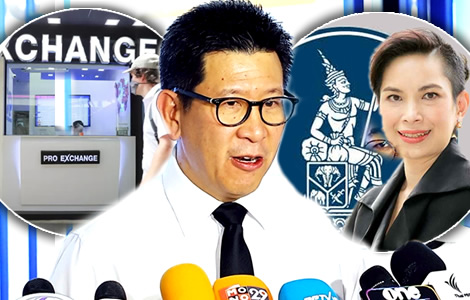Thailand strengthens US and ASEAN economic ties as rare earth deals, trade frameworks, digital commitments, and anti-corruption measures aim to boost economic growth, increase transparency, stabilise the baht and counter China-related risks effectively.
Negotiations in Kuala Lumpur between Thailand and U.S. officials have outlined a framework for closer cooperation on rare earths, trade, and currency stability, with the dollar-to-baht rate remaining critical for exports. The agenda faces controversy, seen as a strategic shift toward the U.S. trading regime, extending into financial and digital markets. Despite potential challenges, especially with China, it offers Thailand a major economic opportunity and a chance to put its economy on a sustainable footing, driving structural change, transparency and action against corruption.

This week, the ASEAN summit with the United States took place in Kuala Lumpur, drawing widespread attention across diplomatic and economic circles. In addition to the Thai-Cambodian peace deal, a high-profile Memorandum of Understanding on rare earth elements was signed between Thailand and the United States. While the MOU is non-binding, it establishes a framework with significant potential economic benefits for Thailand.
Specifically, the agreement comes as firms linked to China intensify mining operations in northern Myanmar. These operations have caused pollution across northern Thailand, particularly along the Kok River.
Furthermore, Thai authorities report that mining occurs in areas controlled by armed rebel groups and warlords. Consequently, the government has limited control over these activities. Officials also note that despite the local impact, most economic benefits from these operations flow to China.
Rare earth mining in northern Myanmar raises economic and environmental concerns about China
Meanwhile, the rare earth MOU has sparked political debate in Thailand. Prime Minister Anutin Charnvirakul took steps to reassure China, stating that the agreement does not threaten its northern neighbour or largest trade partner.
Moreover, officials emphasised that the MOU opens a new avenue for engagement with the United States, complementing ongoing U.S.-Thai trade negotiations.
Finance Minister Ekniti Nitithanprapas clarified that the U.S.-Thai trade framework remains under negotiation. He explained that the framework currently proposes a reduction of U.S. tariffs on selected Thai products from 36% to 19%.
Additionally, officials expressed hope that further concessions could be secured once the United States finalises its commitments. These concessions are intended to increase Thai exports and expand access to U.S. markets.
Thai-US trade framework continues negotiations with tariff reductions and future export expansion openings
The U.S. government has indicated flexibility in the negotiations. Meanwhile, Thai exports continue to face pressures under the current tariff regime, which has already taken effect. Therefore, authorities stressed that the framework provides a structured, predictable approach for future adjustments.
Furthermore, the trade agreement covers the digital economy. Thailand has agreed not to impose digital taxes or charges on U.S. digital sales until the OECD’s global tax framework is implemented.
This measure benefits U.S. technology companies, which dominate online markets and digital commerce. At the same time, Thailand is emerging as a regional hub for data centres connected to U.S. networks. These developments signal growing infrastructure investment and technological integration.
On Wednesday, October 29, 2025, Finance Minister Ekniti announced he will lead an investigation into illegal money transfers beginning in December. He insisted that the government will not manipulate currency values and confirmed that negotiations with the United States regarding taxation will continue.
Finance minister leads probe into illegal money flows while maintaining currency stability and trade talks
Ekniti also serves as Deputy Prime Minister and chairs the Subcommittee on Investigating Financial Traces and Money Laundering Related to Cybercrime. The subcommittee’s mission is to track money laundering and illicit financial flows linked to cybercrime. Furthermore, it seeks to raise auditing standards to meet international benchmarks.
The subcommittee brings together multiple oversight agencies. Members include the Bank of Thailand, the Anti-Money Laundering Office, the Department of Special Investigation, and the Securities and Exchange Commission.
In addition, the Ministry of Justice and Royal Thai Police are included. The Minister of Justice and the Minister of Digital Economy and Society also participate. This structure allows for effective data integration and coordinated investigation of grey money.
Ekniti set clear targets for the subcommittee. By December 2025, authorities must identify the full routes of illegal capital flows. They must document origins, patterns, and destinations of illicit funds. Importantly, he emphasised this is a long-term mission, not a temporary initiative. The subcommittee’s work is designed to elevate standards and ensure full compliance with OECD, IMF, and BIS protocols.
Subcommittee aims to map illicit financial flows and raise auditing standards to international benchmarks
Investigators have raised concerns over capital flows linked to illicit activity, including organised scam networks. They are specifically examining trades in gold and cryptocurrencies. Authorities have directed all relevant agencies to connect systems, close loopholes, and implement stricter oversight measures.
Meanwhile, Ekniti chairs the Strategic Negotiation Committee for U.S.-Thai trade talks. Online discussions with the U.S. Trade Representative have already taken place. These discussions follow an ASEAN-level framework and continue provisions established by the previous government.
Talks have focused on product categories subject to tariffs and exemptions. All documents related to negotiations were reviewed, and certain products may be eligible for tax reductions. The private sector and the Ministry of Commerce actively participate in this process.
Officials clarified that products not exported to the U.S., such as right-hand-drive vehicles, pose no concern. The Ministry of Commerce also noted that existing Free Trade Agreements provide benchmarks for negotiations. Consequently, the framework promotes transparency, ensures balanced trade, and aligns with U.S. expectations.
Trade negotiations focus on product tariffs, exemptions, and alignment with US and ASEAN standards
In a joint statement, the U.S. Treasury and Bank of Thailand confirmed that neither country will use exchange rate policy to gain a competitive advantage. Instead, interventions will focus on preventing abnormal market volatility.
Ekniti confirmed that the Bank of Thailand has mechanisms in place to maintain currency stability. He emphasised that the BOT is responsible for both price and exchange rate management.
The Bank of Thailand reached a consensus with U.S. regulators on managing the baht. Officials reiterated that the central bank does not manipulate the kingdom’s currency. Thai authorities also noted concerns that the baht is currently priced high relative to international markets.
The BOT’s mandate is to manage extreme volatility, not long-term value. Furthermore, the bank regularly publishes monthly reports on external reserves and financial movements. This level of transparency compares favorably with regional peers.
US and BOT confirm currency management policies to prevent volatility and ensure transparency
The subcommittee investigating financial flows is part of the broader Anti-Scammer Committee. This committee is chaired by Prime Minister Anutin Charnvirakul. Vice chairs include the Royal Thai Police Commissioner, Minister of Justice, and Minister of Digital Economy and Society.
Key participating agencies are the Bank of Thailand, AMLO, DSI, and SEC. Their goal is to integrate supervision and investigation of illicit funds across domestic and international transactions.
The subcommittee also aligns with international standards. Officials cited OECD, IMF, and BIS anti-money laundering requirements. The AMLO serves as the primary enforcement mechanism. Authorities confirmed that the grey money investigation will be long-term and will employ a “Connect the Dots” methodology. This approach traces financial networks, identifies loopholes, and monitors cross-border flows.
Authorities aim for initial results by December 2025, focusing on high-risk transactions. Existing laws allow partial enforcement, but standards and data systems are being updated. This modernisation covers both domestic and international transactions, particularly cryptocurrencies, which often involve external servers and cross-border settlements.
Anti-scam committee integrates agencies to monitor illicit funds and comply with international standards
The Bank of Thailand outlined the currency management framework in three points. First, the exchange rate policy will not be used for a competitive advantage. Second, Thailand and the U.S. will increase transparency in exchange rate reporting. Third, international reserve data will be published monthly according to IMF standards, which the BOT already implements.
Officials emphasised that these points reaffirm existing practices rather than introducing new commitments. The U.S. government has monitored exchange rate policies of trading partners for years, reviewing current account balances and bilateral trade figures.
Thailand was on the U.S. monitoring list in 2020 and 2021, but no longer faces restrictions. Trade negotiations provided an opportunity to publicly confirm that exchange rates will not be manipulated to gain advantage.
Thailand will continue policies to maintain exchange rate stability. These measures are consistent with international norms and similar to practices in Japan, Switzerland, and South Korea. The Bank of Thailand will oversee currency and financial flows while providing regular reports on progress.
Bank of Thailand confirms exchange rate policies align with international norms and US expectations
Thailand’s strategy integrates trade, digital economy expansion, and financial regulation. Government agencies are coordinating to secure foreign investment, protect domestic markets, and prevent illicit financial flows. By December 2025, authorities aim to report detailed findings on capital movement and ensure all participating agencies operate under international standards.
The combination of the rare earth MOU, trade framework, digital commitments, and anti-money-laundering measures demonstrates Thailand’s multi-faceted economic strategy. Officials stress that all actions adhere to existing laws and maintain transparency. These efforts aim to strengthen Thailand’s economic position, enhance trade with the United States, and secure the baht’s stability.
Authorities also focus on mitigating risks associated with illicit financial activities and cybercrime. Agencies involved in enforcement, auditing, and trade negotiation are expected to report developments and monitor compliance continuously. The government’s integrated approach combines oversight, trade facilitation, and digital infrastructure development.
The ASEAN summit agreements, along with subcommittee actions, illustrate Thailand’s structured engagement with the United States. Officials confirmed that rare earth, trade, digital economy, and financial oversight agreements will proceed within clearly defined legal frameworks.
Thailand integrates trade, digital, and financial measures to strengthen its economy and secure baht stability
The Finance Ministry, Bank of Thailand, and other participating agencies will monitor implementation, enforce regulations, and provide public updates to maintain transparency and confidence in the Thai economy.
In the meantime, Thailand has also signed an upgraded ASEAN-China free trade pact. However, it is notable that exports from China to both the ASEAN bloc and Thailand continue to grow well ahead of exports to the Chinese market.
Boost for long haul tourism as America’s United Airlines opens direct flights to and from Thailand via Hong Kong
Finance Minister issues warning on year-end growth and rising cost of public debt. Danger of the Abyss
Prime Minister Anutin signs accord with Cambodia witnessed by US President Trump in Kuala Lumpur
The new era beginning under the Trump administration is a continuation of policy from the Biden era, except that it is more direct. Indeed, it seeks a framework with each trading partner based on quantifiable metrics, a more balanced trade environment, and heightened traceability of products and financial movements.
In turn, this may prove beneficial as it gives Thailand direct access to the world’s largest export market, in addition to the U.S.-dominated digital economy. The demands coming from the United States regarding transparency and traceability are nothing more than a call for Thailand to address endemic corruption that has undermined the country’s economy in previous decades.
Join the Thai News forum, follow Thai Examiner on Facebook here
Receive all our stories as they come out on Telegram here
Follow Thai Examiner here
Further reading:
American economic and political power at work as Deputy Prime Minister Ekniti promises to keep faith
Steely new line being taken as Thailand toughens its Cambodian border posture. Families ordered out
PM confirms government’s referendum plan to scrap MOUs with Cambodia. Top People’s Party MP shocked
Leader of deadly scam gang in Cambodia and henchmen still at large with 4 more Thais arrested
Police in Cambodia close in on fake scam loan app leadership after family murders in Samut Prakan
Cambodian cybercrime industry run by Chinese criminals could be generating up to 38% of its GDP
Debt and ฿1.7 million loss to scammers drive man to murder his wife and two sons in Samut Prakan
Loan shark arrested in Nonthaburi for bullying a borrower charged an annual interest rate of 730%
Bank of Thailand to tackle household debt in new plan from 2024 which will see higher standards


















